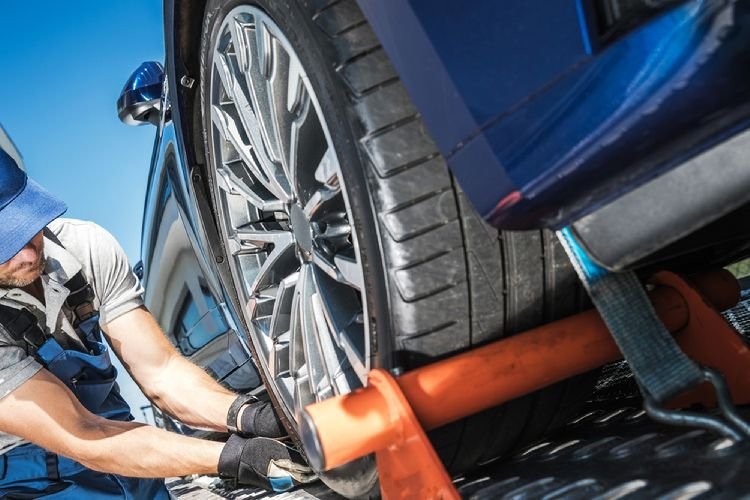Facing financial difficulties and missing car payments can be incredibly stressful. Many car owners in this situation might consider hiding their vehicle to avoid repossession. While the idea of outsmarting the repo man might seem appealing in the short term, it’s crucial to understand the potential repercussions. So, what if the repo men can’t find your car? Does this mean you’ve solved your problem? Unfortunately, hiding your car is rarely a long-term solution and can lead to more serious legal and financial troubles.
Can You Successfully Hide Your Car from Repossession?
Repossession agents are professionals trained to locate and recover vehicles efficiently. They typically begin searching for a vehicle soon after a lender initiates the repossession process, and their search can last for up to 30 days. Depending on your loan agreement and state laws, repossession can start surprisingly quickly, sometimes just a day after a missed payment. It’s important to be aware that in many jurisdictions, lenders are not even required to notify you of when or where they will attempt to repossess your vehicle. Researching your local state laws online is the best way to understand your rights and what to expect during a repossession.
Borrowers may attempt various tactics to conceal their cars. Parking a vehicle in a locked garage is one of the few methods that can temporarily prevent immediate repossession. Repo companies generally cannot legally enter a locked private garage or breach a closed gate, as this is often considered a “breach of peace.”
Other common, but less effective, strategies include removing license plates, parking the car on different streets, or storing it at a friend’s house. However, repossession companies are experienced and familiar with these avoidance techniques. They use various methods and technologies to track down vehicles.
Even if you manage to initially hide your car, it’s important to recognize that the lender will not simply give up on recovering their asset.
Legal Repercussions: The Replevin Process
If a repossession company is unable to locate your vehicle, they will inform the lender of their unsuccessful search. The lender’s next step is often to pursue legal action against you. This can involve taking you to court to obtain a replevin order.
A replevin is a legal procedure that compels you to return the vehicle to the lender. Unlike the initial repossession process, where you might not receive direct notice, the replevin process requires the lender to notify you. You have the legal right to be informed about the court hearing and even dispute the lender’s claim.
However, if you have genuinely defaulted on your car loan agreement, and especially if it’s proven you are actively hiding the vehicle, the lender is highly likely to win the replevin case. The court order will then legally obligate you to surrender the car.
Furthermore, even if the repo man couldn’t initially find your car, the costs associated with the search don’t disappear. You will likely be held responsible for the fees incurred by the lender for hiring the repossession company, as well as any storage fees that accrue once the vehicle is eventually recovered and stored before auction. Importantly, you remain liable for the deficiency balance – the remaining loan amount even after the car is sold at auction and the proceeds are applied to your debt.
How Repo Companies Can Legally Recover Your Vehicle
When borrowers deliberately hide their vehicles to prevent repossession, and a repo agent cannot retrieve the car without risking a breach of peace (like entering a locked garage), lenders often seek legal recourse.
They can petition the court for a replevin order or pursue a monetary judgment against you. A replevin, as mentioned, is a court order demanding you surrender the vehicle. A monetary judgment, on the other hand, obligates you to pay the outstanding loan balance, along with any additional fees and costs.
You are legally entitled to receive written notification of the lender’s intention to seek a replevin order. This notice must include details about a hearing, including the location, date, and time, and inform you of your right to contest the action.
State laws regarding replevin vary, particularly in the timeframe you have to respond to the complaint and request a hearing. It is critical to research your state’s specific replevin laws and consult with a legal professional to understand your rights and options.
Ignoring a replevin is a serious mistake. Failure to comply with a court order and refusal to return the vehicle can lead to both civil and criminal penalties, potentially including charges related to theft.
Can You Proactively Prevent Car Repossession?
Instead of resorting to hiding your car and facing legal battles, the most effective approach is to proactively communicate with your lender if you anticipate difficulties making car payments.
Reach out to your lender as soon as you foresee a potential problem. Explain your situation honestly and inquire about available assistance programs. Many lenders are willing to work with borrowers to avoid the repossession process. Options they might offer include allowing you to skip a payment and add it to the loan’s end or to the following month.
Refinancing your auto loan is another potential solution. Refinancing replaces your existing loan with a new one, ideally with more favorable terms and a lower interest rate. The primary goal of refinancing is to reduce your monthly payment, often achieved by securing a lower interest rate or extending the loan term.
However, to qualify for refinancing, you typically need to have held your current loan for at least a year, and ideally, your credit score should have improved since you initially took out the loan. While some lenders might approve refinancing even with minimal credit score improvement, this is not guaranteed.
ACE Tip: If refinancing seems like a viable way to prevent repossession, it’s crucial to shop around and compare offers from multiple lenders to secure the best possible deal. While you can refinance with your current lender, getting quotes from other lenders provides valuable leverage and comparison.
Even if your lender ultimately cannot offer direct assistance, simply initiating communication and being upfront about your challenges can significantly improve your standing with them. Lenders generally prefer to avoid repossession as well, and proactive communication demonstrates your willingness to find a solution.
The Power of Communication in Avoiding Repossession
Preventing repossession hinges on proactive communication and transparency with your lender – not on evasion and concealment. Ignoring calls and notices from your lender can damage your relationship and make them less inclined to help. Contact your lender at the first sign of financial strain, or as soon as you anticipate missing a car payment.
Exploring Auto Loan Deferment Options
Many lenders offer deferment programs to assist borrowers facing temporary financial hardships like job loss, medical emergencies, or other unforeseen events. Deferment allows you to temporarily pause your car payments. Lenders often prefer deferment over repossession, as repossession is a lengthy and costly process for both parties.
Deferment policies vary among lenders, so carefully review the terms and conditions. Some lenders may require you to continue paying interest during the deferment period, meaning you are only postponing the principal payment. Deferred payments are not waived; they are typically added to the loan’s back end and must be repaid later. Deferment is generally not an option if you have already missed payments.
Alternative Solutions Beyond Deferment
If you are already in the repossession process, there are still potential avenues to explore to regain control of the situation. Generally, three main options exist, although only two allow you to retain your vehicle:
- Loan Reinstatement: If you have fallen behind on payments and are facing default and repossession, you might be able to reinstate your loan. This usually involves paying all past-due payments in a single lump sum to bring your loan current.
- Loan Redemption: Redemption involves paying off the entire outstanding balance of your car loan in full. If your car has already been repossessed, redemption might be an option to get it back. However, this requires having substantial funds readily available.
- Vehicle Surrender: If deferment, reinstatement, and redemption are not feasible, voluntarily surrendering your vehicle might be the most practical course of action. Surrendering the car voluntarily can save you money by avoiding repossession fees, and it allows you to return the vehicle at your convenience and retrieve your personal belongings.
Ultimately, numerous resources and processes are in place to support borrowers facing challenges with their auto loans. Difficulties can arise unexpectedly, and the more proactive and communicative you are in addressing a potential repossession, the greater your likelihood of achieving a positive resolution.
Alt text: Professional headshot of Meghan Carbary, Senior Automotive Financing Editor, expert in auto loans and finance.
By Meghan Carbary
Senior Automotive Financing Editor


